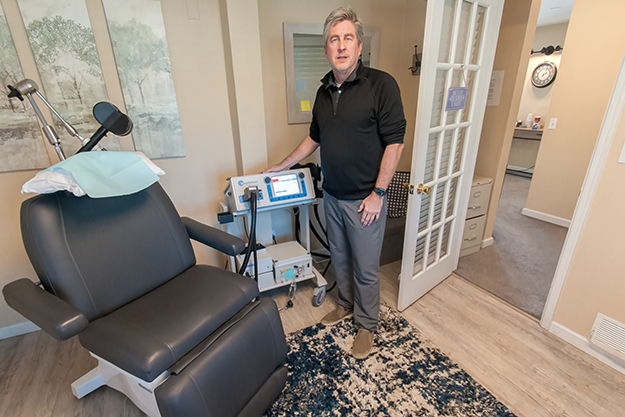A joke in high school led Kris Peterson to help others.
"Some of my friends were interested in the military, and one day they put an application to West Point on my desk as a joke," began the native of Lakewood, WA. "I was not a military person, I was much more interested in medicine."
Intrigued by the idealism of the academy, and after graduating from Lakes High School in 1983, Peterson entered West Point.
"It was really a challenge for me knowing that I wanted to go into medicine," he continued, "but I felt called to be there."
Commissioned in 1987, Peterson attended medical school at the Uniform Services University of Health Sciences. As a student, he was interested in pediatrics.
"I also did a few rotations in psychiatry, and I really felt that it had my interest," he said.
Graduating with his MD in 1991, Peterson began a four-year internship and residency in psychiatry at the Walter Reed Medical Center. Following that, he completed a two-year fellowship in child and adolescent psychiatry.
"I felt then that everything really clicked. I knew where I wanted to be."
After a one year deployment to Korea, Peterson arrived at the Madigan Army Medical Center at Joint Base Lewis-McChord in 1998 and was placed in charge of the child and adolescent psychiatry program. "I worked to make it a program for military families and their children," he explained.
Deploying to Iraq in 2003-2004, he returned to Madigan to serve as the Chief of the Department of Psychiatry. "It was my objective to find treatments to treat depression, anxiety and post-traumatic stress disorder (PTSD) for soldiers, veterans and family members."
In doing so, Peterson learned about Transcranial Magnetic Stimulation, or TMS.
"I was very impressed with the early results of using TMS in late 2008 and early 2009," he continued. "I was interested in TMS and other novel therapies. But then in 2011 I deployed to Iraq."
Dr. (Col.) Peterson retired from the Army in 2012. He then worked part-time for the Army and the Puyallup Tribe while beginning his practice in Lakewood.
"I am dedicated to finding solutions to depression, anxiety and PTSD; it is my passion, it gives me purpose," he added.
That purpose - a key component in his work and life - led Peterson to open Touchstone TMS in 2019.
A specialty provider of FDA-approved psychiatric therapies for treatment-resistant depression, and other mental health disorders, the clinic offers both transcranial magnetic stimulation (TMS) and SPRAVATOTM (esketamine) therapies for patients who have struggled to achieve remission from medications alone.
TMS is non-invasive and involves no sedation. It takes about 15 minutes, is painless, and people can drive to and from appointments. It usually takes about 30 to 40 treatments to result in 70 percent response rates.
"Through neuromodulation, TMS changes areas of the brain to work more efficiently," explained Peterson.
Working independently of TMS, SPRAVATO (a nasal spray) creates synaptic excitability, connectivity, and modulatory responses that also works to defeat anxiety, depression and PTSD.
To better understand the positive results of TMS and SPRAVATO, Peterson and his staff study electroencephalograms (EEGs), track behavioral interventions to see if outcomes improve, and compile individual case reports.
"We've made more progress in the last five to 10 years of my 30-year career than we've ever seen, and I think there's more to come," concluded Peterson.
To learn more about Touchstone TMS and its four locations, visit www.touchstonetms.com; email info@touchstonetms.com; or call (253) 393-9099.
SPONSORED




Read Comments